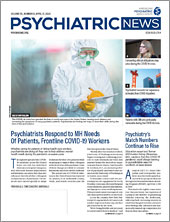As the novel coronavirus enters our communities, profoundly affecting some “hot spots” and perhaps sparing other regions, everyday reality changes and keeps changing. Imagine a Salvador Dali painting, animated and running in slow motion. We observe as the scene bends around us, and then we become part of the bending scene. As psychiatrists, bending to find ways to continue our work in patient care, administration, or research, we may find our boundaries moving in unexpected directions.
The most obvious boundaries may also be the earliest ones to shift. We may begin by physically distancing ourselves from patients and colleagues, at first by creating a six-foot berth around ourselves, moving the chairs in our office farther apart, altering the way we usher people through the door. Next, we make the shift to telepsychiatry, seeing patients on computer and phone screens, perhaps from our homes instead of our offices. Inpatient psychiatrists may be seeing some patients in a C-L capacity on the COVID ward, without the benefit of the therapeutic milieu and donned in personal protective equipment. How do we establish a therapeutic connection in this strange context?
We might attend to how we can weave old, familiar elements of our offices or our interactions into the new reality to foster a sense of continuity. Most of my patients want to meet by videoconference. They feel more connected if they can see my face. Visible in the space behind me now is the plant that has been in my office since my third year of residency. My patients recognize it, and I hope it is subtly soothing. Others want to meet only by telephone. Perhaps to see me in a new environment would feel disruptive, and they prefer to imagine my voice coming from my office, although there are many other possible reasons to avoid videoconference, including fear of technology or weariness from too many video meetings in their own workdays.
The physical shift in workspace may coincide with other interpersonal recalibrations. As my patients see me in my home, a painting visible on the dining room wall behind me, and I see them in their homes, new fantasies may emerge about my life outside the office. What else might they get to see or learn about me?
The therapeutic work is not so gradually being bent by my patients’ fears and requests for grounding and reassurance. It feels disingenuous and unhelpful to respond to their questions by reflecting the question back. These days, I often check in early in the session by asking about coping strategies. In that context, more than one patient has asked me how I’m coping: “Are you afraid?,” “How do you deal with anxiety?,” “Do you think we’re going to die?”
In the old way of the world, I would have moved asymptotically around questions that shifted the focus onto me. In a mere couple of weeks, the frame has bent; delicately avoiding these questions would feel unkind, almost inhumane. As the physical distance between me and my patients has increased, the interpersonal space has become more intimate. We are two human beings doing our best to manage a crisis together. I strive to be a role model for coping and resilience, and that includes being honest and authentic in new ways.
Writing this toward the beginning of the crisis in the United States, I have no idea how long this will last or what further frame shifts are on their way. What other adaptations will we have to make in our work? When the pandemic recedes, how will we reenter our workspaces and restore our former routines? Will interpersonal boundaries fall back into their old places, or will they be fundamentally altered by this shared experience?
As always, part of our work as psychiatrists is to notice, engaging our observing egos even as the ground shifts beneath our feet. Like standing on a waterbed during an earthquake, we become hyperaware of the need to maintain balance, shift our weight, shift again, and continue recalibrating as long as we must. ■

